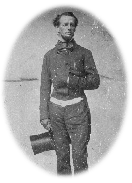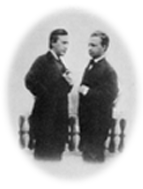
|
|
Professional Career While still an amateur songwriter, Foster realized that the minstrel stage was the key to securing an audience for his songs. At first, he circulated manuscript copies among various minstrel troupes. After "Oh! Susanna" became a national hit following its performance by the Christy Minstrels in 1848, the song was widely pirated by more than two-dozen music publishing firms, who earned tens of thousands of dollars from sheet music sales. But Foster received a mere $100 from a single firm in Cincinnati. In that regard, "Oh! Susanna" was a financial failure for Foster, but he learned two valuable lessons: one, his potential to earn significant sums from songwriting and, two, the need to protect his artistic property. During 1848 and 1849, eight more of his minstrel songs were published, including "Uncle Ned," and "Nelly Was a Lady." Determined to make a full-time career of writing songs, Foster left his bookkeeping job in Cincinnati and returned to Pittsburgh in late 1849 or early 1850. On December 3, 1849, he signed a contract with the New York music publisher, Firth, Pond, & Co., thus officially beginning his professional career. At first, Foster wrote ballads and dances for parlor singers and pianists as well as minstrel songs, often referred to as "Ethiopian" songs, for professional theatrical performers. The minstrel songs, like the ballads, had simple melodies and accompaniments, but their texts, written in dialect, depicted African-American slaves as simple, good-natured creatures. Some of his earliest minstrel texts even had crude caricatures and terms, i.e. "Away Down Souf" (1848) and one verse that was later deleted form "Oh! Susanna." But as Foster grew more ambivalent about the earlier "Ethiopian" songs, he began offering a different image, that of the black as a human being experiencing pain, love, joy, even nostalgia. "Nelly Was a Lady" (1849) is an eloquent lament of a slave for his loved one who has died, apparently the first song written by a white composer for the white audience of the minstrel shows that portrays a black man and woman as loving husband and wife, and insists on calling the woman a "lady," which was a term reserved for well-born white women. "Angelina Baker" (1851) similarly laments a slave who has been sent away by "old Massa." "Ring, Ring de Banjo!" (1851), despite its apparent surface of frivolity, has the slave/singer leaving the plantation "while the ribber's running high," a reference to escaping while the bloodhounds could not pick up his scent, and traveling to freedom on the Underground Railroad. "Old Folks at Home" (1851), which was to become the most popular of all Foster's songs, conveys a sentiment that had almost universal appeal--yearning for lost home, youth, family, and happiness. Increasingly, the "Ethiopian" songs used the same musical style that Foster created for his parlor ballads. E.P. Christy
During this period, Foster also turned his hand to instrumental music aimed very specifically for the parlor. The "Social Orchestra," published in 1854 by Firth, Pond, & Co., was a compendium of 73 arrangements for flute, violin, piano, and other instruments. The selections ranged from operatic--including thirteen tunes by Donizetti--and classical--Jullien, Abt, Mozart, and Schubert--to popular airs, including his own. The collection was ideal for informal home entertainment; the arrangements lent themselves to various combinations and numbers of instruments and included many tunes for dancing, a favorite parlor pastime. The collection proved to be very popular, but for Foster it was not a money-maker. He received a flat fee of only $150 from the publisher, which may explain why this was his only venture into instrumental arranging. Foster occasionally composed piano pieces, but song writing was his real forte, and he returned to it once the "Social Orchestra" was completed. Foster's "Hard Times Come Again No More," published in early 1855, was both a reflection of recent events in his personal life and a portent of things to come. He and Jane separated for a time in 1853 and his closefriend, Charles Shiras, died during that same period. During 1855, both his parents died. His song output diminished--only four new songs in that year--and his debts increased. He was forced to draw advances from his publishers, then found himself unable to supply the new new songs he had promised them. As the Civil War approached, Foster's once-promising songwriting career seemed to be doomed. His contracts with his publisher had ended, and he had sold all future rights to his songs to pay his debts. Possibly in an effort to revive his popularity, Foster reverted to writing plantation melodies. Of the four he wrote in 1860, one is among his most memorable (and infamous) compositions--"Old Black Joe." Belying the racial condescension its title epitomizes in the Civil Rights era, "Old Black Joe" comes closest of Foster's famous songs to the African- During these final years, Foster also wrote a group of Sunday school songs and hymns for song books published by Horace Waters. Some of them, such as "Give Us This Day Our Daily Bread," are lovely; "We'll Still Keep Marching On" is an example of the spirited homiletic style of many of these pieces, which were intended for children. Altogether, Foster produced almost one hundred songs during his final years in New York. While few are scarcely known today, one remains an all-time favorite--"Beautiful Dreamer,"written in 1862 and published after his death in 1864. Because he did not perform music professionally, as most songwriters did to support themselves, Foster himself was not well known to the public. Even during his lifetime, his songs were often referred to as folk songs. For example, during the Gold Rush "Oh! Susanna" became a kind of theme songs for the Forty-niners, who improvised countless new lyrics for the jaunty tune as they made their way to California. Today, most school children (as well as adults) still know the tune, but comparatively few can identify Stephen Foster as the composer. Foster's only real income was the royalty he earned on sheet-music sales. Altogether he made $15,091.08 in royalties during his lifetime and almost nothing in performing rights (yearly average was $1,371 for his 11 most productive years). His heirs, Jane and Marion equally, later earned $4,199 in royalties, so that the total known royalties on his songs amounted to $19,290. Today, it would be worth millions.
|
The Center for American Music is part of the University of Pittsburgh Library System.
Copyright © 2010 Center for American Music. All content is protected by copyright and may not be copied and/or used for any purpose without written consent.
Last updated November 19, 2010
 Foster informed Christy that--as we would put it today--he was trying to reform minstrelsy by writing texts suitable to refined taste, instead of "trashy and really offensive words," and that certain of his songs should be performed in a pathetic, not a comic style. (By "pathetic," Foster meant "to engender compassion.") Foster also began using the term "plantation song" for his new compositions, many of which were gentle and nostalgic in text with music that hinted at Irish or Italian ancestry. Soon he dropped dialect altogether from his texts and eventually referred to his songs as "American melodies." The verse-chorus structure of these songs made them suitable for both the minstrel stage and the parlor. In addition to "Old Folks at Home," some of Foster's characteristic songs of this type from the early 1850s are: "Farewell, My Lilly Dear" (1851), "My Old Kentucky Home, Good Night" (1853), "Old Dog Tray" (1853), "Jeanie With the Light Brown Hair" (1854)
Foster informed Christy that--as we would put it today--he was trying to reform minstrelsy by writing texts suitable to refined taste, instead of "trashy and really offensive words," and that certain of his songs should be performed in a pathetic, not a comic style. (By "pathetic," Foster meant "to engender compassion.") Foster also began using the term "plantation song" for his new compositions, many of which were gentle and nostalgic in text with music that hinted at Irish or Italian ancestry. Soon he dropped dialect altogether from his texts and eventually referred to his songs as "American melodies." The verse-chorus structure of these songs made them suitable for both the minstrel stage and the parlor. In addition to "Old Folks at Home," some of Foster's characteristic songs of this type from the early 1850s are: "Farewell, My Lilly Dear" (1851), "My Old Kentucky Home, Good Night" (1853), "Old Dog Tray" (1853), "Jeanie With the Light Brown Hair" (1854)  American spiritual, and it approaches that tradition with sympathy andrespect. It is like a secular hymn, praising the noble spirit of the laborer at the end of his life. Sometime during that year, Stephen finally left Pittsburgh and moved his family to New York. About one year later, Jane took Marion back to Pennsylvania, and Stephen spent the remaining few years of his life in New York, living alone in lodging houses and theater district hotels. His trunk of manuscripts and letters was lost somewhere in these moves. Because of the uncertain economy of war time, he no longer could get a publishing contract, and like all other songwriters was forced to sell his compositions outright to publishers with no prospect of future earnings. Instead of writing his own lyrics, as he had done so successfullyin the past, he began collaborating with a young poet, George Cooper, probably late in 1862 or early in 1863. Cooper's texts were of a light-hearted, humorous vein, designed to appeal to musical theater audiences. Songs they wrote together include: "There Are Plenty of Fish in the Sea" (1863) "Kissing in the Dark" (1863) "My Wife is a Most Knowing Woman" (1863) "If You've Only Got a Moustache" (1864) "Mr. & Mrs. Brown" (1864) The pair also produced some Civil War Songs--"Willie Has Gone to War" and "For the Dear Old Flag I Die!" for example--but Foster's earlier songs found far more favor among soldiers and civilians from both North and South than did these later songs.
American spiritual, and it approaches that tradition with sympathy andrespect. It is like a secular hymn, praising the noble spirit of the laborer at the end of his life. Sometime during that year, Stephen finally left Pittsburgh and moved his family to New York. About one year later, Jane took Marion back to Pennsylvania, and Stephen spent the remaining few years of his life in New York, living alone in lodging houses and theater district hotels. His trunk of manuscripts and letters was lost somewhere in these moves. Because of the uncertain economy of war time, he no longer could get a publishing contract, and like all other songwriters was forced to sell his compositions outright to publishers with no prospect of future earnings. Instead of writing his own lyrics, as he had done so successfullyin the past, he began collaborating with a young poet, George Cooper, probably late in 1862 or early in 1863. Cooper's texts were of a light-hearted, humorous vein, designed to appeal to musical theater audiences. Songs they wrote together include: "There Are Plenty of Fish in the Sea" (1863) "Kissing in the Dark" (1863) "My Wife is a Most Knowing Woman" (1863) "If You've Only Got a Moustache" (1864) "Mr. & Mrs. Brown" (1864) The pair also produced some Civil War Songs--"Willie Has Gone to War" and "For the Dear Old Flag I Die!" for example--but Foster's earlier songs found far more favor among soldiers and civilians from both North and South than did these later songs.